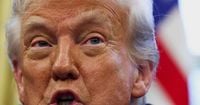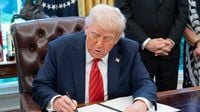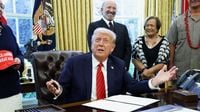On April 17, 2025, President Donald Trump sparked controversy with his remarks about Mexico and Canada, asserting that both nations "live off" the United States and would have "nothing" without it. Speaking from the Oval Office, Trump emphasized the economic dependency of his neighbors on the U.S., claiming that without American commerce, neither country would exist as they do today.
During a press conference, Trump likened the United States to a "big, beautiful department store" that every nation desires a piece of, including China, Japan, Mexico, and Canada. He stated, "If you think of the United States as a big, beautiful store, everyone wants a piece of that store. China wants it. Japan wants it. Mexico, Canada—they live off that. Without us, they would not have a country." His comments reflect a longstanding narrative within his administration that positions the U.S. as the primary economic engine for its neighbors.
Trump's statements came as he discussed the tariffs he has implemented on various imports, underscoring that he does not plan to eliminate these tariffs but intends to impose limits. "We’re going to put a tariff, we’re going to put some parameters, and we’re going to say, come and buy," he explained, asserting that the tariffs are beneficial in attracting more businesses to the United States.
On April 16, 2025, Trump had a phone conversation with Mexican President Claudia Sheinbaum, which he described as "very good conversations with Mexico." This dialogue marks a continuation of discussions between the two leaders since Trump’s election victory on November 6, 2024. Previous talks have focused on migration issues and measures to counter fentanyl trafficking into the U.S., but the latest discussions have shifted towards negotiations aimed at avoiding tariffs on Mexican products.
In her response, Sheinbaum confirmed the productive nature of their recent call, stating, "We had a call with President Trump yesterday. As he mentioned on his account, it was very productive. We will continue talking to reach good agreements that benefit our countries and our peoples." Despite the looming tariffs, goods produced in Mexico that are covered by the United States-Mexico-Canada Agreement (T-MEC) have so far remained exempt from additional taxes.
Trump’s comments have reignited debates about the economic relationships within North America. Critics argue that such statements undermine the collaborative spirit that has characterized U.S.-Mexico-Canada relations, particularly in light of the T-MEC, which was designed to foster mutual economic growth and cooperation.
Moreover, Trump's rhetoric could have implications for future negotiations, especially as he has also expressed a willingness to abandon the T-MEC if he deems it unfavorable. This stance raises concerns among trade analysts who fear that such a move could destabilize the economic framework that has benefited all three nations.
As Trump continues to assert the importance of U.S. consumers as the main draw for countries with commercial ties to the United States, he faces the challenge of balancing assertive trade policies with the need for diplomatic relations. "If we don’t reach an agreement, we will impose limits or tariffs, we will set some parameters and say, 'come and buy'... they always have the right to choose not to do it," he remarked, emphasizing the leverage the U.S. holds in international trade.
Trump's administration has maintained that tariffs are a necessary tool to protect American interests, particularly against countries perceived to be taking advantage of the U.S. market. However, the potential for retaliatory measures from Mexico and Canada looms large, as both nations may respond to increased tariffs with their own trade barriers, further complicating the economic landscape.
As the negotiations unfold, the focus will likely remain on how these tariffs and economic relationships evolve, especially in light of the upcoming presidential elections in the U.S. The political ramifications of Trump's comments and policies could significantly influence voter sentiment, particularly among those concerned about economic stability and international relations.
In summary, Trump's assertions about Mexico and Canada highlight the complexities of North American trade relations and the delicate balance of power that exists between these nations. As discussions continue, the outcomes will have lasting effects on the economic fabric of the region, shaping the future of trade and cooperation in North America.






